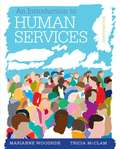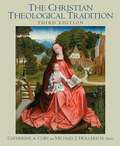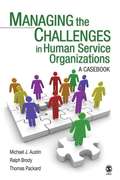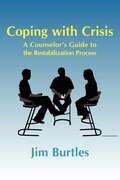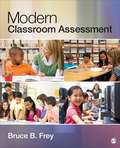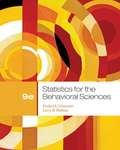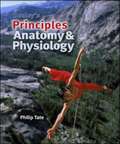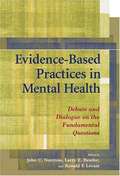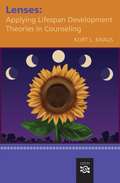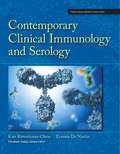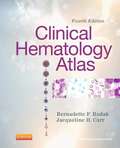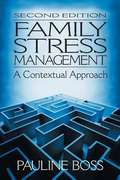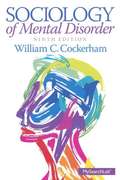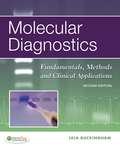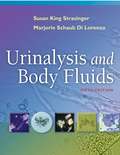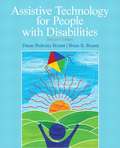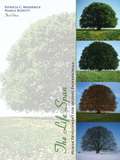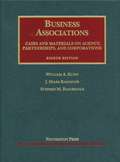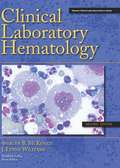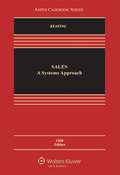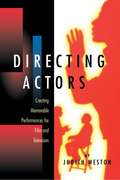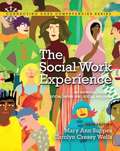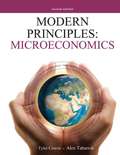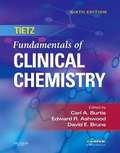- Table View
- List View
An Introduction to Human Services (Eighth Edition)
by Marianne Woodside Tricia McclamOffers an introduction to the human services profession. Based on the authors' extensive experience as practitioners, educators, and researchers, this text defines human services, reviews the historical development of the field, provides an overview of the profession, and emphasizes the skills needed to succeed as a human services practitioner
The Christian Theological Tradition (Third Edition)
by Catherine A. Cory David T. Landry Michael J. HollerichThis text helps students acquire a basic theological literacy in key persons and events of the Bible and the Christian faith, and in Christianity's encounter with culture at large. Historically arranged, it also addresses five major themes of systematic theology: revelation, God, creation, Jesus, and church.
Managing the Challenges in Human Service Organizations: A Casebook
by Michael J. Austin Ralph Brody Thomas PackardManaging the Challenges in Human Service Organizations: A Casebook offers current and aspiring human service managers a view into the kinds of experiences they will likely encounter to better prepare them for the world they are about to enter. The cases are inspired by real situations and are designed to encourage students to determine how they would act and work towards a resolution of the dilemmas presented. Key Features Simulates administrative dilemmas through cases that offer different aspects of agency administration and replicate aspects of actual practice Levels the learning field for students entering graduate human service management programs with different managerial experiences Orients students to the challenges of management by helping them develop mental models linked to the values of client-centered administration Helps students develop a beginning sense of competence and understanding of managerial work while refining their analytic skills Offers the opportunity for repeated learning opportunities using different analytical frameworks Supplements fieldwork by providing more time to reflect and consider a broader array of alternatives than is found in most field experiences Intended Audience This book is ideally suited as a supplemental text for advanced undergraduate and graduate courses in social work and counseling, as well as a much-needed reference for human services supervisors and practitioners.
Coping With Crisis: A Counselor's Guide to the Restabilization Process
by Jim BurtlesIn the wake of a catastrophic event, the witness may discover or experience unsettling emotions which can trigger subsequent behaviors. These reactions can lead to a number of consequences, some of which are unproductive.
Modern Classroom Assessment
by Bruce B. FreyThe objective of this text is to go beyond simply listing the basic assessment formats by exploring five broad up-to-date approaches or philosophies to assessment with the supporting scholarship and theory to guide their appropriate use.
Statistics for the Behavioral Sciences (9th Edition)
by Larry B. Wallnau Frederick J GravetterThe author illustrates the importance of statistics in the study of behavioral science and how it provides researchers with objective and systematic methods for describing and interpreting their research results.
Seeley's Principles of Anatomy and Physiology
by Philip TateThe author presents comprehensive descriptions and illustrations along with ample clinical information to help anatomy and physiology students develop a solid understanding of the concepts and how that knowledge relates to the medical world.
Evidence-Based Practices in Mental Health: Debate and Dialogue on the Fundamental Questions
by John C. Norcross Larry E. Beutler Ronald F. LevantAddresses fundamental questions in the debate on evidence-based practices (EBPs) such as What qualifies as evidence? What qualifies as research on which to judge effective practice? Are research patients and clinical trials representative of clinical practice? Are evidence-based treatments readily transportable to clinical practice? and others. Positions are argued with passion and intelligence. Each question-focused chapter concludes with a dialogue among the contributors in which they emphasize their points of agreement and disagreement. The debate, interchange, and dialogue format makes this an ideal tool for teaching and discussion. For mental health practitioners, trainers, and graduate students.
Lenses: Applying Lifespan Development Theories in Counseling
by Kurt L. KrausLenses offers a current and practical review of human development perspectives and theories, a subject that is often critically under-represented in graduate courses. Kraus presents an expansive selection of human development models, theories, and perspectives, and demonstrates how a strong grasp of developmental principles can inform practical applications.
Contemporary Clinical Immunology and Serology
by Kate Rittenhouse-Olson Ernesto De NardinThis complete, up-to-date introduction to immunology takes students from basic vocabulary through common immunoassays to closer consideration of the specific diseases that require immunologic methods of diagnosis. CLINICAL IMMUNOLOGY AND SEROLOGY presents today's newest professional techniques, thoroughly preparing students to work in modern clinical immunology laboratories, understand the data generated there, and apply the conclusions to deliver superior patient care. Full-color charts and illustrations engage students and enhance comprehension, and the text's content has been extensively classroom-tested. It contains the most up-to-date information to accurately reflect what in done in the clinical immunology laboratory. Every chapter contains review and critical thinking questions, as well as a detailed case study.
Clinical Hematology Atlas (Fourth Edition)
by Bernadette F. Rodak Jacqueline H. CarrAn excellent companion to Rodak's Hematology: Clinical Principles & Applications, this atlas is ideal for helping you accurately identify cells at the microscope. It offers complete coverage of the basics of hematologic morphology, including examination of the peripheral blood smear, basic maturation of the blood cell lines, and discussions of a variety of clinical disorders. Over 400 photomicrographs, schematic diagrams, and electron micrographs visually clarify hematology from normal cell maturation to the development of various pathologies. Normal Newborn Peripheral Blood Morphology chapter covers the unique normal cells found in neonatal blood. A variety of high-quality schematic diagrams, photomicrographs, and electron micrographs visually reinforce your understanding of hematologic cellular morphology. Spiral binding and compact size make this book easy to use in a laboratory setting. Coverage of common cytochemical stains, along with a summary chart for interpretation, aids in classifying malignant and benign leukoproliferative disorders. Morphologic abnormalities are presented in chapters on erythrocytes and leukocytes, along with a schematic description of each cell, to provide correlations to various disease states. Body Fluids chapter covers the other fluids found in the body besides blood, using images from cytocentrifuged specimens. Updated information on the subtypes of chronic lymphocytic leukemia (CLL) helps you recognize variant forms of CLL you may encounter in the lab.
Disability: A Diversity Model Approach in Human Service Practice (Second Edition)
by Romel Mackelprang Richard SalsgiverThis comprehensive text fills a huge void in the field! Romel W. Mackelprang and Richard O. Salsgiver introduce an empowerment approach to working with persons with disabilities -- a direction that lights the way for human service workers and provides clients with greater independence and resilience. The authors are ardent in their desire to empower persons with disabilities by building on their strengths. This comprehensive book features a ground-breaking, strengths-based approach that fills a void in the available material on this topic, and thoroughly prepares helpers to work successfully with persons who have disabilities.
Family Stress Management: A Contextual Approach (Second Edition)
by Pauline BossIn this Second Edition, the author continues to explore both the larger context surrounding families and stress and the inner context, which includes perceptions and meanings. The author emphasizes the need for a more general contextual model of family stress and crises than other models. The goal is to provide a framework for students and professionals engaged in helping families learn how to manage their stress.
Sociology of Mental Disorder (9th Edition)
by William C. CockerhamThis edition of book is includes the most recent literature and research on mental disorder including topics like DSM-5, examining socio-demographic factors, assessment of differences between male-female psychological distress etc.
Molecular Diagnostics: Fundamentals, Methods and Clinical Applications (Second Edition)
by Lela BuckinghamThe textbook, written for students enrolled for Clinical Laboratory Science/Medical Technology programs, explains the principles of molecular technology that are used for diagnostic purposes.
Urinalysis and Body Fluids (Fifth Edition)
by Susan King Strasinger Marjorie Schaub Di LorenzoThis thoroughly updated 5th Edition provides you with concise and carefully structured full-color instruction in the handling and analysis of non-blood body fluids. You will learn how to handle and preserve the integrity of body fluid specimens and how to keep yourself and your laboratory safe from infectious agents! Practical, focused, and reader friendly, this popular text teaches the theoretical and practical knowledge every clinical laboratory scientist needs to handle and analyze non-blood body fluids, and to keep you and your laboratory safe from infectious agents. The 5th Edition has been completely updated to include all of the new information and new testing procedures that are important in this rapidly changing field. Case studies and clinical situations show how work in the classroom translates to work in the lab.
Assistive Technology For People With Disabilities (Second Edition)
by Diane Pedrotty Bryant Brian R. BryantAssistive Technology for People with Disabilities, Second Edition, includes eight comprehensive chapters that focus on devices and software to enhance the lives and promote the independence of people with disabilities. Updated with new research, content and features to address current developments in the field, the book approaches assistive technology and education in a lifespan, multidisciplinary manner by discussing the use of current technology in the fields of special education, rehabilitation, speech-language pathology, and other disciplines. Featured devices and software will help you understand how areas such as mobility, communication, education, independent living, and access to information media affect learning and living for individuals with disabilities. You will also gain a great understanding of the foundational and historical perspectives of AT, assessment, universal design, and the ADAPT framework, which is a tool to help educators make decisions about appropriate AT, student needs, and the demands of the environment. Developed from the authors' years of experience teaching both K-12 students and adults, as well as their own framework for understanding assistive technology application and integrating technology into instruction, this new edition addresses assistive technology that promotes knowledge and skills, practical application and a myriad of opportunities that good technology provides for persons with disabilities.
The Life Span: Human Development for Helping Professionals (Third Edition)
by Patricia C. Broderick Pamela BlewittBased on extensive research, the book effectively provides an array of information about principles of human development from birth to death.
Business Associations: Cases and Materials on Agency, Partnerships, and Corporations (Eighth Edition)
by William A. Klein J. Mark Ramseyer Stephen M. BainbridgeWith the prior edition of this concise, up-to-date casebook having been adopted at over 100 law schools, the eighth edition preserves the authors' tradition of providing a comprehensive overview of agency, partnership, and corporation law. It also continues to emphasize six basic editorial principles: Be lean but not mean, cases edited ruthlessly to produce a readable and concise result. Facts matter, so they are included in all their potential ambiguity. Bring a planner's perspective to the table through extensive use of transactionally-oriented problems. It's a casebook not a treatise. No long, stultifying textual passages. Provide the cases and let the individual teacher use them as he or she sees fit. Try to find cases that are fun to teach. Great facts or a clever analysis are always given first priority in case selection. Provide a teachers' manual that goes into great depth, with analysis of every case and, whenever applicable, offering the disparate views of each author. An exhaustive teachers' manual extensively discusses every case and provides answers to every question in the text. One feature that many adopters find especially helpful is that all three editors give their own approach to the cases, showing the different ways in which the same case can be taught. Annually updated PowerPoint slides cover almost all sections of the book and feature an extensive use of data, graphics, and photos.
Clinical Laboratory Hematology (Second Edition)
by Shirlyn B. MckenzieDesigned to meet the needs of both clinical laboratory technicians and clinical laboratory scientists, CLINICAL LABORATORY HEMATOLOGY has been updated into a brand new edition. This comprehensive--yet easy to read--guide to hematology and hemostasis features cutting-edge technologies, high-quality photographs and micrographs, case studies, and convenient dual-level (basic and advanced) presentation of information. Visual cross-referencing (symbols) throughout make finding information exceptionally easy. Key chapters are presented by a number of different authors and experts in the field and include information on: cellular homeostasis; the Stucture and Function of Hematopoietic Organs; Hemolytic anemia; Nonmalignant lymphocyte disorders and much more.
Sales: A Systems Approach (Fifth Edition, Aspen Casebook Series)
by Daniel KeatingA problem-based casebook organized using sales systems including those governing domestic sales of goods, leases, international sales, and real estate sales.
Directing Actors: Creating Memorable Performances for Film and Television
by Judith WestonInternationally-renowned directing coach Weston demonstrates what constitutes a good performance, what actors want from a director, what directors do wrong, script analysis and preparation, how actors work, and shares insights into the director/actor relationship.
The Social Work Experience: An Introduction to Social Work and Social Welfare (Sixth Edition)
by Mary Ann Suppes Carolyn Cressy WellsLearn how social workers use their professional expertise to assist people. This text is part of the Connecting Core Competencies Series. The Social Work Experience: An Introduction to Social Work and Social Welfare introduces students to the profession of social work including eight major fields of practice, and provides in-depth discussion of social welfare policy, its history, contemporary issues, and probable future trends. The book helps students understand how social workers use their professional expertise to assist people in solving a wide variety of problems to improve their lives. There are three major parts: The first part, Social Work and its Context, comprises four chapters which introduce the profession of social work, provide theoretical perspectives underlying generalist practice, investigate the concept of social justice, and explore social welfare policy and its history. The second part, Professional Practice Settings, offers an in-depth discussion of eight fields of practice: family and children's services, mental health, health care, schools, older adult services, criminal justice, and developmental disabilities. The third and final part, A Look to the Future, views the profession through the eyes of futurists and explores the challenges and opportunities that await new social workers. A better teaching and learning experience This program will provide a better teaching and learning experience-for you and your students. Here's how: Personalize Learning - MySearchLab delivers proven results in helping students succeed, provides engaging experiences that personalize learning, and comes from a trusted partner with educational expertise and a deep commitment to helping students and instructors achieve their goals. Improve Critical Thinking - Discussions on values, ethics, human diversity, and generalist social work practice throughout stimulate students to think critically about varying issues. Engage Students - Case studies introduce each chapter and are carefully developed to illustrate the myriad of problems that social workers deal with in daily practice. Explore Current Issues - Includes new content on a variety of issues, including policy diversity, the environment, and much more. Apply CSWE Core Competencies - The text integrates the 2008 CSWE EPAS, with critical thinking questions and practice tests to assess student understanding and development of competency. Support Instructors - An Instructor's Manual and Test Bank, Computerized Test Bank (MyTest), BlackBoard Test Item File, MySearchLab with Pearson eText, and PowerPoint presentations are included in the outstanding supplements package. Note: MySearchLab does not come automatically packaged with this text. To purchase MySearchLab, please visit: www.mysearchlab.com or you can purchase a valuepack of the text + MySearchLab (at no additional cost): ValuePack ISBN-10: 0205223095 / ValuePack ISBN-13: 9780205223091
Modern Principles: Microeconomics (Second Edition)
by Tyler Cowen Alex TabarrokThe book explains how markets generate cooperation from people across the world, how prices act as signals and coordinate appropriate responses to changes in economic conditions, and how profit maximization leads to the minimization of industry costs.
Tietz Fundamentals of Clinical Chemistry (Sixth Edition)
by Carl A. Burtis Edward R. Ashwood David E. BrunsA condensed, student-friendly version of Tietz Textbook of Clinical Chemistry, this text uses a laboratory perspective to provide you with the chemistry fundamentals you need to work in a real-world, clinical lab. Accurate chemical structures are included to explain the key chemical features of relevant molecules. Offering complete, accurate coverage of key topics in the field, it's everything that you expect from the Tietz name! More than 500 illustrations and easy-to-read tables help you understand and remember key concepts. Key words, learning objectives, and other student-friendly features reinforce important material. Chapter review questions are included in an appendix to test your knowledge. A two-color design makes it easier to read and easy to find important topics. In-depth, reader-friendly content is appropriate for MT/CLS and MLT/CLT students and may also be used by laboratory practitioners, pathology residents, and others. A new chapter on newborn screening discusses the basic principles, screening recommendations, inborn errors, methods, and interpretation of results. A comprehensive glossary provides easy-to-find definitions of key terms. An Evolve website provides regular updates of content, answers to review questions, and web links to related sites for further research and study.
